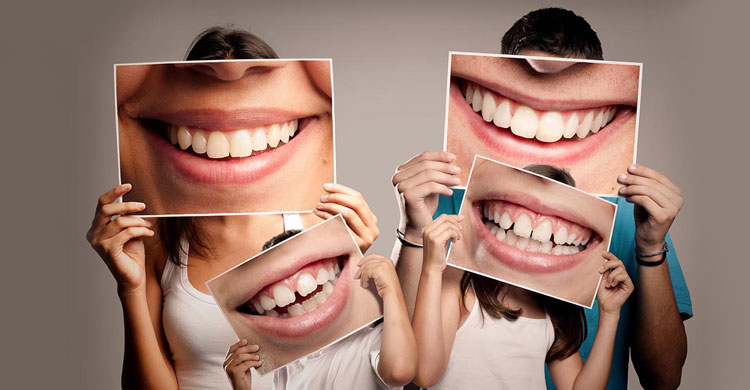
Blog Posts
RECENT BLOG POST


04 Aug 2021


10 Aug 2021


10 Aug 2021


By Dr. Aastha Chandra

07 Sep 2021
MYTHS IN DENTISTRY
Myth 1: Sugar Causes Cavities.
While sugar does contribute to the formation of cavities, it’s not the sugar itself that causes the problem. Rather, it’s the bacteria that eats the sugar. Sticky food, like starches, attracts bacteria to thrive on and around teeth. These bacteria produce an acid compound that promotes tooth decay. Rinse and brush after meals to reduce acid and plaque buildup.
Myth 2: Brushing Harder Cleans Better.
Brushing harder is counterproductive. The harder you brush, the more trauma the tooth enamel and gum tissue endure. It can eventually lead to other problems such as gum recession and unnecessary wear of the tooth. Brush gently for two minutes, twice daily with a soft-bristled brush.
Myth 3: Flossing Is Not Really Necessary And It Creates Spaces Between The Teeth
Flossing is an integral part of maintaining good oral health. Plaque deposits promote teeth decay and Flossing removes up to 80% of plaque
Flossing does not create spaces between your teeth. In fact, flossing helps prevent decay between your teeth. When you floss, you’re removing food debris nestled around your teeth and gums, which helps keep them healthy and removes harmful bacteria. When you begin a flossing routine, you may experience bleeding gums, but after a few weeks of steady flossing, the bleeding tends to decrease. If your gums still bleed with flossing over time, the gum disease might be more severe and it is recommended to visit your dentist to help determine the cause and proper treatment plan.
Sometimes if you have plaque and tartar build-up in between and behind your teeth, it can be difficult to floss. A professional clean up (scaling and polishing), can help remove that build-up and make it easier for you to establish a successful flossing routine.
Myth 4: Dental Cleaning Can Cause Sensitivity.
Dental cleaning or scaling is a non-invasive procedure, required in cases of excessive accumulation of plaque and tartar on and between the teeth. Calculus or tartar on teeth forces the gums to recede. Scaling exposes areas of the teeth that were previously covered with tartar, thus exposing the tooth roots. This might cause temporary sensitivity which resolves in a day or two.
Myth 5: Dental Cleaning Can Lead To Tooth Mobility.
Unless a person is suffering from periodontitis (a serious gum disease that damages the gum and bone supporting the tooth), scaling does not lead to mobility of the tooth.
Regular dental checkups and scaling every six months can help in preventing periodontitis.
Myth 6: Cleaning Teeth Involves The Removal Of Enamel (the upper layer of teeth).
Cleaning or dental scaling does not require any anaesthesia and is done with the help of an ultrasonic scaler. Ultrasonic scaling involves mechanical vibration of the scaling tips, which are blunt, along with continuous irrigation with water. It is used to remove hard calculus from the surface of the tooth and does not affect the enamel or any oral tissue.
Myth 7 : Kids Don’t Need To Brush Baby Teeth.
Baby teeth are very important! They provide the necessary space for permanent teeth to line up underneath the gums and grow in properly. Cavities in baby teeth—if not addressed in the right way—can cause tooth loss much earlier than is natural, resulting in a space. If this happens, a dentist can make an artificial space maintainer until the permanent tooth grows in, but baby teeth are the best natural space maintainers.
Poor oral health early on can lead to lifelong complications. Kids should start brushing twicer per day as soon as they have teeth. Tooth decay in children can lead to health concerns long after their baby teeth are gone.
Myth 8: Infants Do Not Require Any Oral Care As They Don’t Have Teeth.
An infant’s oral care is as important as that of an adult. Cleaning of an infant’s mouth using a damp or wet gauze piece after every session of breastfeeding is important to ensure that no residual milk is remaining in the oral cavity.
Myth 9: Removing A Tooth From The Upper Jaw Can Hamper Your Eyesight.
Removing a tooth from the upper jaw does not affect the eyes at all. The nerves associated with eyes are the optic nerve, the oculomotor nerve, the abducens nerve and the trochlear nerve whereas nerves related to the upper jaw are the posterior superior alveolar nerve, the greater palatine nerve, the nasopalatine nerve and the infraorbital nerve. The nerves of the upper jaw are totally unrelated to the nerves of the eye.
Myth 10: Removing Wisdom Teeth Affects The Brain.
Wisdom teeth are the third and last molars on each side of both jaws. They can erupt between the age of 18 to 26 years. Since they usually appear much later than the other teeth, at an age where people are probably “wiser”, they are called wisdom teeth. Removal of wisdom teeth does not have any effect on the brain.
Myth 11: You Only Need To Go To The Dentist If Your Teeth Hurt.
“Prevention is better than cure.” Hence, diagnosing and curing a tooth problem at an earlier stage is much easier and cost-effective than if it were to be addressed later.
Even if you aren’t experiencing dental pain, it is recommended to visit a dentist twice a year for regular cleanings and exams. Some dental issues are asymptomatic but can still cause infection and need treatment. If you were to wait too long, the treatment needed may be more expensive than if the disease were caught before it worsened. Also, the tooth has a lesser chance of being saved at a later point in time.
Altogether, prevention saves you both time and money in the long-run.
Myth 12: Oral Health Is Not Connected To The Rest Of The Body.
Your oral health is connected to your systemic (overall) health and there are many correlations between your mouth and body. A mouth with severe tooth decay and periodontal disease is more likely to cause bacteria to enter into the bloodstream and result in other health issues. Studies have found a link between periodontal disease and heart disease, diabetes, cancer, and more.

